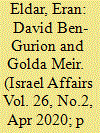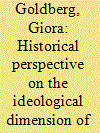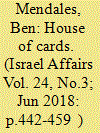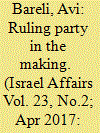|
|
|
Sort Order |
|
|
|
Items / Page
|
|
|
|
|
|
|
| Srl | Item |
| 1 |
ID:
171048


|
|
|
|
|
| Summary/Abstract |
Relations between David Ben-Gurion and Golda Meir were complex and saw many ups and downs over the years. Having enjoyed fruitful collaboration prior to and after Israel’s establishment, with Meir even appointed foreign minister at the height of her career, they were never close friends. The relationship took a steep downhill course in the early 1960s, culminating in Ben-Gurion’s secession from the ruling Mapai party and the establishment of his own rival Rafi party. This article describes and analyzes the complex relationship and the rift between these two central leaders of Mapai and its impact on the party and on the political map.
|
|
|
|
|
|
|
|
|
|
|
|
|
|
|
|
| 2 |
ID:
177702


|
|
|
|
|
| Summary/Abstract |
The notion that development towns, founded at the dawn of the state of Israel, have become slums for North-African Jewish immigrants as part of a deliberate policy that served the status interests of the veteran, dominant Ashkenazi population, is a common perception among some scholars, which has recently taken root among the Israeli public, as well.
|
|
|
|
|
|
|
|
|
|
|
|
|
|
|
|
| 3 |
ID:
163294


|
|
|
|
|
| Summary/Abstract |
This article argues that since 1977 policy changes of the new Likud government were small, but they engendered a tremendous shift in consciousness, as well as a symbolic change. Israel’s character as a Jewish state was greatly augmented. A new Israeli identity emerged, grounded primarily in Jewish roots with a preference for communal over state identity. Political ideologies in democracies are poor. The ‘iron law of ideology’ states that political parties, principally those that form governments, do not realise their ideological principles. The case of Herut, the maternal party of Likud, is a typical example of this law.
|
|
|
|
|
|
|
|
|
|
|
|
|
|
|
|
| 4 |
ID:
160292


|
|
|
|
|
| Summary/Abstract |
For the first 28 years of Israel’s existence, the Arab minority was represented in the Knesset by a series of ‘satellite lists’ affiliated mainly with the Mapai party and, later, with the Alignment (Labour). This article explores the role of the satellite lists in the early years of the state, and the reasons for their ultimate demise. The fate of these lists would be inextricably tied to the overall political development and political liberation of their constituencies. Their relative success was intimately connected to the disarray of Palestinian Arab society after the 1948 war, the political isolation of the Arab minority and a belief held by the Jewish leadership that the traditional Arab notability could be co-opted. The satellite lists could not survive for long once these factors were mitigated and a more authentic alternative leadership had evolved.
|
|
|
|
|
|
|
|
|
|
|
|
|
|
|
|
| 5 |
ID:
169979


|
|
|
|
|
| Summary/Abstract |
Shmuel Asher Kaufman (1927–1947) died in a live ammunition training accident as a member of the Palmah in spring 1947. His father, Yehuda Kaufman Even-Shmuel (1886–1976), lovingly reconstructed his brief life and his story entered Israeli mythology, along with that of his fiancée Zohara Levyatov, as symbolic of the loss of the young Israeli men and women whose lives were lost in the struggle for Israel’s independence. This article examines the process by which Shmuel’s life was memorialized by his father in the decade after his death. It also begins to mine the wealth of documentation provided by this memorialization of Shmuel’s life in order to examine from a unique perspective the variety of social, religious, and educational choices available to members of the Yishuv’s elite during the Mandate period. In addition, it discusses the impact of Shmuel Kaufman’s tragic death on the crisis of Yehuda Even Shmuel’s Zionist vision, which led him to resign from the Mapai Party in 1947.
|
|
|
|
|
|
|
|
|
|
|
|
|
|
|
|
| 6 |
ID:
151814


|
|
|
|
|
| Summary/Abstract |
The article discusses the transformation of Mapai, the main political party in Israel’s pre-state years, into the ruling party of a sovereign state. By way of doing so Mapai went through three distinct stages, from striving to build a working class of rural and urban labourers, to seeking immediate statehood via rapid mass immigration and partition, to acting as an effective ruling party, or the ‘party of the state’ as it called itself, following the November 1947 UN partition resolution. It was in charge of creating the machinery of government during a time of war, and this fostered hierarchical patterns characteristic of a sovereign rule, notably the independence of the government vis-à-vis the political parties, including Mapai itself.
|
|
|
|
|
|
|
|
|
|
|
|
|
|
|
|
|
|
|
|
|